‘Like a horror movie’: The men defending their homes in Sudan’s bloody war

Mojahed was one of the few men carrying the dead body of his father’s friend, Muhammad Ahmar. Around 40 mourners had gathered in late May in the Ombada district of Omdurman, a city in Sudan occupied by the Rapid Support Forces (RSF), to witness the burial of this respected figure, the head of a family in his 70s who used to be an architect.
A bullet had pierced his back during one of the RSF lootings in late May. Muhammad was deemed “uncooperative” by the members of the RSF while they were trying to requisition his car; he was shot and left for dead in front of his son.
Sorrow loomed as the burial line reached a local schoolyard, a temporary grave for many victims of the war since April. The presence of violent RSF members close by made it impossible for any proper funeral rites to take place.
“Muhammad was a peaceful and respected man,” Mojahed, who did not wish to give his full name for fear of reprisals, recalls. “On the day before his death, we ran into each other after the evening prayer, and he told me that I looked like my father.”
Blood was still seeping from the gunshot wound, Mojahed says, as he and the other pallbearers laid Muhammad in his grave. The fear of RSF assaults meant a rushed burial, and the schoolyard had become the resting place for many community members killed during the war.
No one thought Omdurman would become a hellscape. Now, Mojahed is living it.
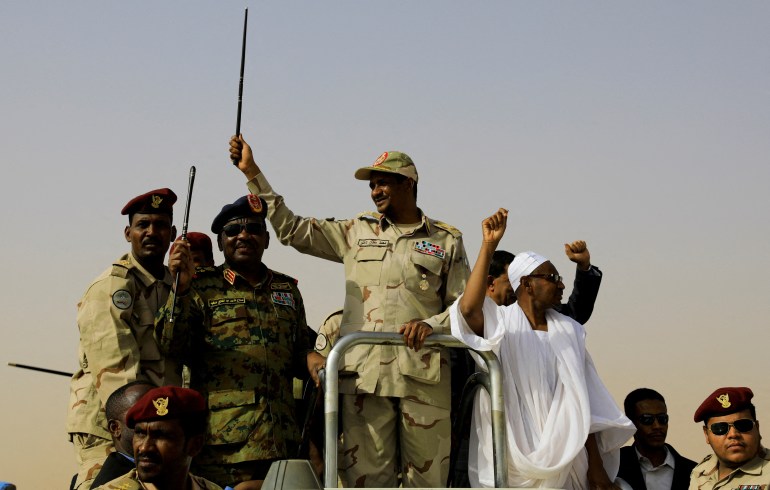
Once a home
Following years of instability and coups, Sudan has been devastated by fighting between the Sudanese army, led by Abdel Fattah al-Burhan, and the RSF, led by his former deputy, Mohamed Hamdan Dagalo, known as Hemedti.
The Rapid Support Forces evolved from the Janjaweed militias from the Darfur region, fighting alongside the Sudanese army against a rebellion in the 2000s. Grasping more power throughout the years, the RSF became an undeniable and brutal force in Sudan, described by Human Rights Watch as “Men With No Mercy”.
The power struggle between these two top generals evolved into a full-scale war on April 15 this year. Since then, more than 5,000 people have been killed, 12,000 injured and millions displaced.
Gunfire and explosions have filled the capital of Khartoum and the western region of Darfur as civilians have fled for their lives. By the end of September, the United Nations said a total of 5.4 million people had been internally displaced or were seeking refuge in other African countries including Egypt, Eritrea and Kenya.
Mojahed’s family are among those millions displaced. Their house, located in a middle-class neighbourhood in Omdurman and once home to dozens of extended family members before the war, now holds just one – Mojahed – as it is in an area which has been taken over by the RSF.
A former police officer now aged 46, he volunteered to stay behind while his wife and two children fled to al-Thawra after the war started – a town 10km (6.2 miles) north of Omdurman and still under army control. The family believed they would be safer there.
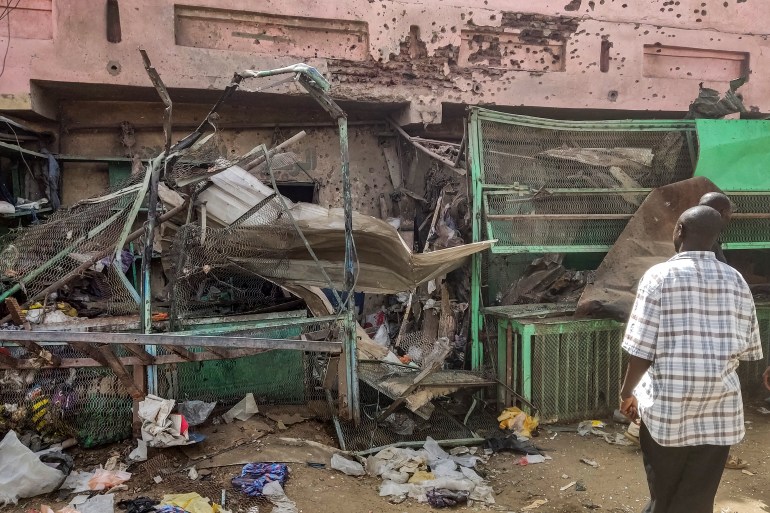
The once-bustling neighbourhood filled with street vendors, teachers and restaurant owners is now crowded with RSF patrols, looking to pick up anyone who looks suspicious. Any adult male civilians may be suspected of being undercover army members. “They [RSF] will constantly question any adults walking on the street or just going to the market,” Mojahed says. “You are asked about where you live and if you are part of the military, undercover.”
According to Mojahed, a whip from a leather stick is the most common weapon the patrol members use during interrogations. Any resistance will be met with bullets or arrest and even torture in one of the nearby RSF camps.
“People that go into [those] camps either never make it back or are released after days of torture,” Mojahed says, describing the encounters he has heard about between the RSF and others living in his neighbourhood. “It’s RSF’s second nature to kill. To them, it’s as easy to take a human life as it is to step on an ant.”
Now, adult men refrain from going to RSF-concentrated areas like the market, sending women and children instead since they have proved less likely to attract the patrol’s attention. Mojahed says he himself has taken to leaving the house carrying only a small amount of cash and a half-broken phone, wearing a jalabiya, a traditional white dress often worn by elders in Sudan, so he appears “old and weak”.
The worst feeling, Mojahed says, is the crushing weight of uncertainty: “You know someone and the next day, you hear people came to their house and killed them. It’s like a horror movie.”
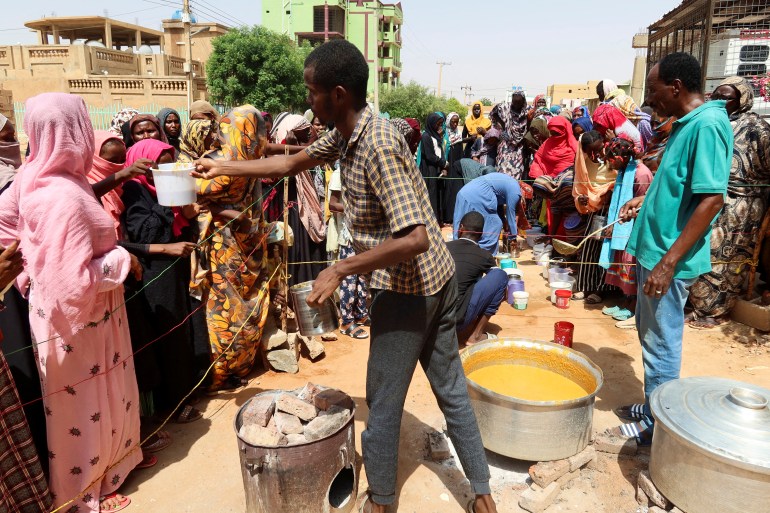
The ones who stayed behind
Millions have fled to other cities and countries since the war started, but some have no choice but to stay behind. Many simply cannot afford to travel and pay rent in a new place. Some have volunteered to stay to protect family properties which have been passed down for generations.
In Omdurman, Mojahed and others who have remained in his neighbourhood have agreed to form an alliance – a community “workforce” – in a collective bid to protect themselves and their properties from lootings and assaults.
Around 20 to 30 men, including Mojahed, have volunteered to stand guard at either end of their street during the day: “If people are not grouped up, the RSF is more likely to harass them,” Mojahed explains. RSF patrols usually do their rounds in groups of fewer than six; 30 workforce members divided into two groups at both ends of the street usually keep the trouble away.
Family members of the workforce often ask why they are lingering instead of fleeing as well. Their common response is: “Leave to where?” Having spent all their lives in this neighbourhood, many like Mojahed cannot bear the idea of abandoning their roots.
Stationed on the street during daylight when RSF members are most active, the workforce’s only mission is to safeguard the area so their community, or at least their street, won’t suffer attacks by RSF raiders. Community members constantly update each other on the status of RSF activity by WhatsApp as they get news or warnings of upcoming patrols or motorcades.
However, internet services are usually cut off by the authorities whenever there are gunshots in the area, something which happens daily. This is an attempt by the government to prevent the RSF from communicating with each other during fighting.
Mojahed believes that cities like Omdurman have in some way been more “fortunate” because of the unstable yet available supply of water and electricity. “Alhamdulillah we still have water and electricity from the government, but it randomly cuts off.”

Mojahed’s family house has become a temporary headquarters of sorts for the neighbourhood workforce. “When the RSF sees a house empty, they are more likely to occupy it or loot it. Everyone looks out for one another. I got closer with some people because of this [workforce],” Mojahed says.
Yet, the day shifts cannot entirely prevent RSF members from patrolling and disrupting the neighbourhood. The “hooligan behaviours” Mojahed talks about refer to the RSF firing shots at children and dogs. Burials, he says, must be performed in backyards as constant lootings and raids torment the rest of the neighbourhood.
At night, Mojahed and the rest of the community sleep in their yards: A single bed, a phone for communication and a pistol for the worst-case scenario are all part of their nightly routine. Mojahed still uses his phone at night to check in on his family. However, the conversations are often cut short by communication blackouts.
Beaten for leaving the area
Tragedy and conflict have become a constant for the people of Sudan. Even intrastate travel can prove extremely dangerous – at least four RSF roadblocks were set up between Omdurman and the neighbouring town, al-Thawra.
When Mojahed’s neighbour, Mukhtar, attempted a 20-minute road trip in early September to have his broken phone fixed, he made it as far as the first checkpoint. Mukhtar’s fit figure and young age flagged him as suspicious to the RSF, who are always on the lookout for the undercover military.
Despite trying his best to prove his civilian status and explain why he needed to travel, Mukhtar was severely beaten, receiving bruises and cuts all over his body. Mojahed says he doesn’t know if his neighbour would have made it back home had it not been for the people living next to the roadblock. They took Mukhtar in and tended to his injuries as best they could.
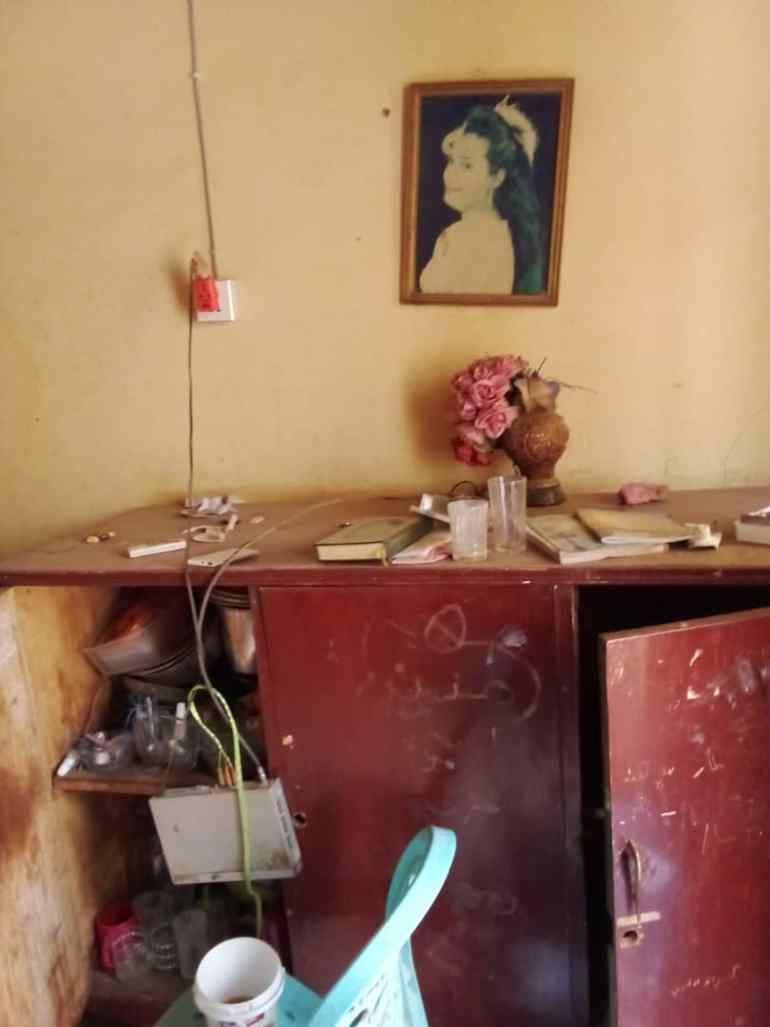
Apart from the community workforces like the one Mojahed is part of, others in Sudan have stayed behind to volunteer for medical aid as hundreds of civilians are injured and transported to hospitals daily.
According to MSF’s (Doctors Without Borders) head of mission in Sudan, Pietro Curtaz, the organisation’s hospitals in Khartoum have received assistance from the Sudanese Ministry of Health, along with local volunteers who organised themselves to work with MSF.
However, volunteers are worn out – the conflict in Sudan has gone on for so long and become so intense. “Although medical needs in Sudan have increased, MSF is now working with half the number of international medical staff as compared to before April, which affects our ability to even maintain these services,” Curtaz tells Al Jazeera.
“The high level of violence and insecurity in Khartoum and Darfur also pose a challenge to patients and health staff to access health services. In some places, patients are delaying seeking medical attention because it is too dangerous to come to us once they have more serious complications.
“International organisations, MSF included, should be doing more – but cannot.
“We are currently working in 10 states in Sudan, and we are seeing massive emerging and pre-existing needs…with the constantly changing security situation, lack of consistency in the visa process and unreliable supply of medical supplies in the country, we are not able to provide assistance to the scale that we would like.”
Dr Waleed Madibo, a senior governance and international development expert, paints a similar picture. The founder of an NGO which focuses on governance in Khartoum, Dr Madibo, who is from East Darfur, believes Sudan requires a “fundamental reboot”.
“I think the war is going to expand before it diminishes,” he tells Al Jazeera. “The war will begin to spread to each part of the country but ultimately it will reach a point where some sort of a consensus [in the country] will be reached [to stop the war].”
“I think al-Burhan [Sudan’s army chief] is a liability for the country, just as Hemedti [leader of the RSF] is. Both are liabilities to the country and even organisations like Forces of Freedom [The Forces of Freedom and Change, FFC].
“All those who were part of the political quagmire before the war can no longer be a part of the government’s equation in the future.”
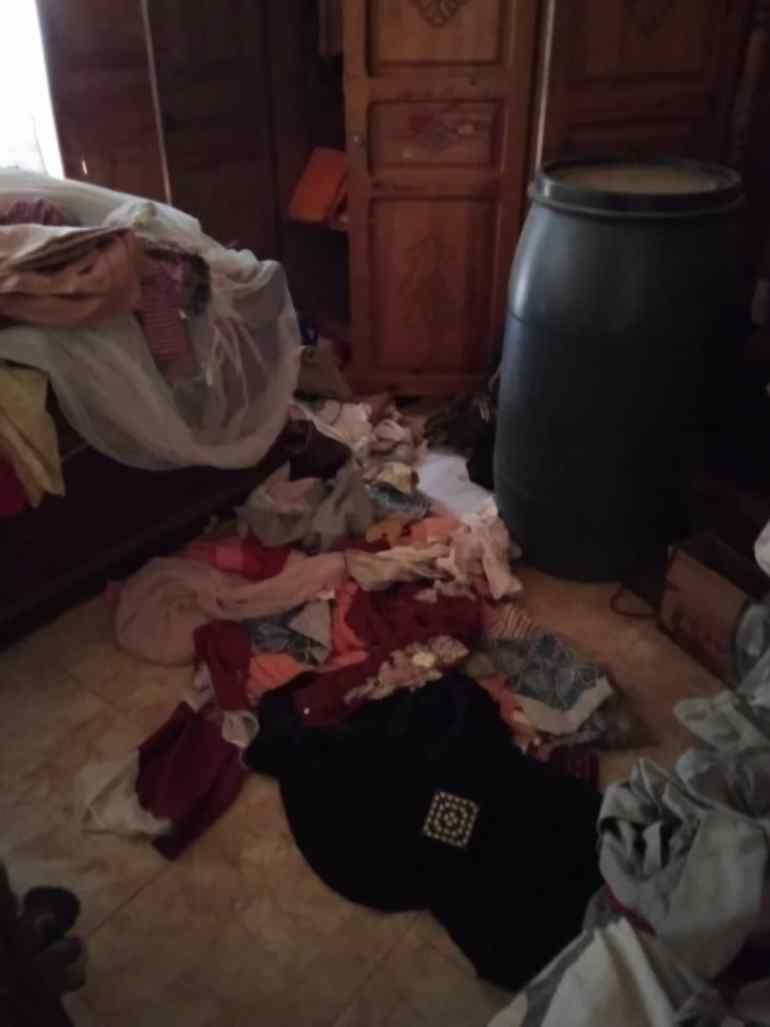
The road away
In the end, and despite his previous determination to stay put, Mojahed has decided not to stay to see Omdurman’s future.
A few days after he spoke to Al Jazeera, Mojahed called back to report a full-scale occupation of his neighbourhood by the RSF.
Doors were kicked down in late September as looters hot-wired cars outside Mojahed’s house. Shattered glass and items of furniture from his house lay strewn on the ground, and RSF officials swore to return the next day to “take all the furniture”.
They were true to their word. The next thing Mojahed remembers, he says, is walking through empty rooms he used to call home. “The community collapsed,” Mojahed says. “It’s only RSF now.”
So Mojahed finally left, along with the rest of the community members. He has gone to al-Thawra to be with his wife and children, forced to give up the land he cared so deeply for.
As for the whereabouts of the rest of the workforce, and the places they have fled to, Mojahed simply doesn’t know. He says he is distraught about leaving. He says he truly believes that if all the men who left had stayed alongside him, with their much bigger numbers collectively, the extent of the damage unleashed by the RSF would have been less, at least in his neighbourhood.
Mojahed is still planning to return to Omdurman, hopefully in the next few days, he says. Not because he still has any hope of defending what’s left of his home – the danger would be too grave – but because he has to gather any valuables left there.
Mojahed wants to sell them so that he can send his two children overseas, or at least as far away as possible from the strife in Sudan.